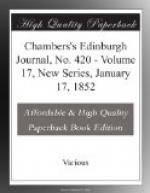addition of the bank-note currency, is comparatively
nothing when weighed against the true and real exchangeable
wealth of Great Britain; wealth of which this coined
and convertible paper-money is merely the standard
sign of value, the recognised medium by which all
things are bartered. It is easy to give one or
two significant and startling illustrations of this
fact—significant and startling in other
respects than in enabling us to see pretty clearly
through the currency-cobwebs industriously woven from
time to time amongst us. All the money in the
three kingdoms, the whole circulating medium of the
realm—gold, silver, copper, paper—does
not certainly exceed, if it reaches, which is very
doubtful, the national revenue for one year, to say
nothing of local rates and burdens! And it would,
moreover, require all the money circulating in Great
Britain and Ireland, including notes to the last farthing,
to pay for the spirits, beer, and tobacco consumed
annually by the people of the United Kingdom!
The note-issues of the Bank of England are about L.19,000,000;
its reserve in gold and silver, as we have seen, is
upwards of L.14,000,000 sterling: these amounts
added together would no more than about discharge
the alcohol and weed score of the country for little
more than seven months! Lightning-flashes these,
that throw vivid gleams over the industrial activity,
resources, powers, plague-spots of this mighty, restless,
enterprising, but far from sufficiently instructed
or disciplined British people.
But let us enter the great money-temple. Very
imposing to me has always appeared the army of clerks
seated in saturnine silence at the desks, or gliding
with grave celerity about the place, and variously
employed in balancing enormous accounts, shovelling
up heaps of sovereigns, receiving and distributing
bank-paper of vast value as coolly and unconcernedly
as if engaged in counting out so many chestnuts.
A strange feeling must, I suspect, perturb the mind
of a newly-appointed clerk amidst all that astounding
wealth, until the genius of the place has so moulded
his thoughts and perceptions, that he has come to
regard himself as but one of the dumb and dead parts
of a mighty machine, over whose action he has no more
control than he has over the courses of the stars.
All these issue, cheque, gold, bullion departments,
with their numerous busy officials, are in truth but
the husk and body of the establishment. They by
whose will and breath it is animated and directed
are nowhere at this hour to be seen. They met
on this as on every other morning in their hall of
inquisition—the Bank parlour—and
decided there, without appeal, without reasons assigned,
in the absence of the parties whose commercial reputation
was trembling in the balance, upon the course of financial
action to be pursued, and upon whose paper should or
should not be discounted. A terrible stroke, sharper
than a dagger could inflict, politely, blandly as
it is performed, is that which falls upon a merchant




